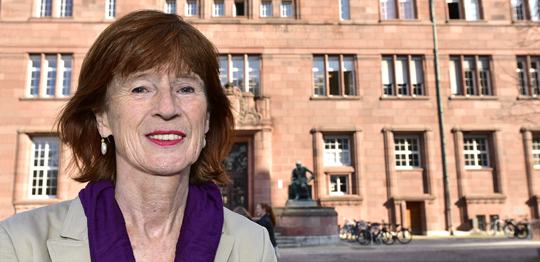Many languages, many benefits
Freiburg, Mar 21, 2017
During the conference “Multilingualism in Society, Politics and Education” international experts, linguists and foreign language instructors at the University of Freiburg convened to discuss current concepts about multilingualism, intercultural communication, integration policies in various countries and life-long learning. Sonja Seidel had a chat with Helga Kotthoff, Professor for German Linguistics at the University of Freiburg and conference co-organizer about the opportunities surrounding multilingualism in Germany.

“Up until now, education policies have ignored the benefits that Turkish-speaking children bring to the classroom”, says Helga Kotthoff, Professor for German Linguistics at the University of Freiburg. Photo: Thomas Kunz
Ms. Kotthoff, which benefits can you identify in children growing up multilingual?
Helga Kotthoff: Multilingual children are no longer outside the norm, not just in Germany, but elsewhere too. The advantage is that it sparks interest in other children as well as in adults to learn a new language. Research findings show that German children and youth in large urban areas learn Turkish through their friends and develop impressive language skills through those interactions. The problem is languages have different levels of prestige. Turkish, for instance, doesn’t have the same reputation as those languages learned at school. Up until now, education policies have ignored the benefits that Turkish-speaking children bring to the classroom. Instead, parents are encouraged to send their German children to kindergartens in which German teachers are supposed to teach them Chinese.
The intention is to give the children a leg up in life, just like the kids who learn English during primary school.
They are able to learn all kinds of languages when presented naturally in every day situations. Playing a recording of English fairytales, on the other hand, is ridiculous. German is literally being pushed out by English as the scientific language of choice. We have barely addressed this issue up to now, but it needs to be placed on the political agenda. We are raising a generation of scientists who can only talk about their area of expertise in English, which, long-term, places science in an even higher ivory tower. In Scandinavia, for instance, this issue is discussed much more. A lot of educators there are saying it is difficult to write books in Swedish or Norwegian because the entire body of research on various scientific topics is in English. For instance, there are no Norwegian terms in the field of genetics. We will be faced with the same issue soon enough in German-speaking countries as well.

Learning a foreign language on the playground: German children and youth learn Turkish while playing with their friends. Photo: jovannig/Fotolia.com
Which recommendations might you have for policy-makers and society in dealing with multilingualism?
Immigrant languages and bilingual capabilities – for instance German with Russian, Turkish or Arabic – should be taken more seriously and appreciated more. The claim that multilingualism comes at the cost of German is complete nonsense along with some political parties’ recommendation that immigrant families speak only German at home. It’s a personal choice as to which language one speaks at home. Why should parents speak a language with their children that they themselves do not fully command? They aren’t able to communicate emotional nuances, which is essential when raising children. Learning German for children happens in a playful way as soon as they go to kindergarten. Even when they mix languages, it isn’t a problem. Researchers have discovered that bilingual people often use different languages for different topics. German is often used, for instance, for every day situations and institutions and their language of origin when children tell each other jokes that they have heard at home in Italian or Portuguese. There are many reasons for switching languages during a conversation.
You conduct research, among other things, that examines the relationship between comedy and migration. What role does humor play?
Comedy builds a protective space around everything that immigrants perceive as foreign. For instance, our culture is very consumer-oriented; for people from other countries that may appear strange at first and can lead to an inferiority complex. It can be very liberating to make jokes about how Germans seem to use a different toothpaste in the morning than in the evening, for instance. Comedy is a method to help people deal with their differences in a self-confident manner. It prevents feelings of shame. Instead of feeling ashamed for being different, one decides to exaggerate what is foreign and what is familiar and to make fun of the peculiarities of each culture. One alienates the familiar and the foreign, placing both at a distance.

